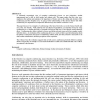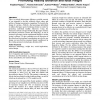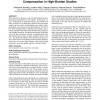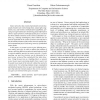1310 search results - page 221 / 262 » Modelling and Using Imperfect Context Information |
ECIS
2004
14 years 11 months ago
2004
The term electronic government (e-Government) generally refers to the use of information and communications technology (ICT) to change the structures and processes of government o...
ETS
2000
IEEE
14 years 9 months ago
2000
IEEE
A commonly encountered view of computer conferencing focuses on peer interaction, student empowerment and a shift in both teacher and student roles. This paper argues that this vi...
CHI
2011
ACM
14 years 1 months ago
2011
ACM
This is a critical design paper offering a possible scenario of use intended to provoke reflection about values and politics of design in persuasive computing. We describe the des...
HUC
2011
Springer
13 years 9 months ago
2011
Springer
Micro-incentives represent a new but little-studied trend in participant compensation for user studies. In this paper, we use a combination of statistical analysis and models from...
P2P
2003
IEEE
15 years 3 months ago
2003
IEEE
Sensor networks, that consist of potentially several thousands of nodes each with sensing (heat, sound, light, magnetism, etc.) and wireless communication capabilities, provide gr...




